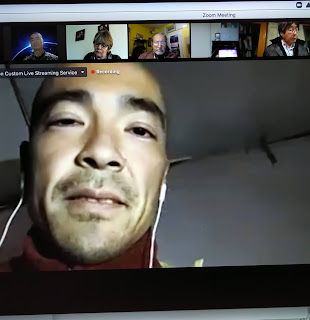If you are wondering what relevance, if any, all this has for you--rest easy. I am not judging you, or about to spew a jeremiad in your general direction.
Nope.
Without mentioning the stress and pressure of COVID-19++ (which I guess I just did), I can say that there is the stark difference in geography and everyday life between you reader, and the events in Japan, Okinawa, Korea, and China. It is a stretch to imagine that, despite our platitudes about being one human family etc etc., we don't usually see these folks or have a conversation with them every day in our neighbourhoods. There is a language difference for most of us which renders all but the most basic of concepts, such as a simple daily greeting, as opaque to us as the surface of the moon. These folks are strangers to us, as we are to them. I struggle with it, too. All the time. I like to think, in my brighter moments, that it keeps me honest.
OK, so let's look at self interest, because that is a well-oiled door to other realities for most people.
The East Asian region is potentially very unstable, and at least two countries have nuclear capability. Nuclear capability is the monster in the closet--release it, and the entire house vapourizes. It's in everyone's interest to keep the lid on the nuclear demon, and it is a delicate balancing act between the negative approach (sanctions, threats, trade embargoes, etc) and the positive approach (diplomacy, appeals to mutual interest, etc). Keeping up with the back and forth of all this calls for a fair amount of intentional reading, and as the events of recent years have taught us, information sources are best read critically and carefully.
This is especially important given some people's tendency to blame China for the presence of COVID-19 in our lives. That's fear talking, and understandably so. But in reality, #19 and its subsequent contagions (yes, there will be more--in our current way of doing economics, we are bound to encounter yet another and another such, because we are penetrating farther and farther into areas previously left alone, and encountering viruses that are all too happy to have a new and unprotected host) could pop up literally anywhere, and for the reasons mentioned in the bracketed statements. So, setting aside suspicion and anger at East Asia, let's keep in mind that we ourselves, with our lifestyles influence world affairs, for better and for worse.
In light of the above, even though we are a relatively very small power, our voice can and does make a difference, hopefully for the better. For you and I, that means informing ourselves and then tapping our local Member of Parliament on the shoulder now and again. Our communications are noted, and the more of them in any given direction, the more they are noted. If you get a reply from your MP, well done! Even if it is to say in so many words that they are on it and you don't need to worry.
I said self interest, didn't I? Although the United States is our predominant trading partner, there is a whack of trade between East Asian countries and ourselves. Do you drive a Mitsubishi? Nissan? Have a Daiwoo tv? Sony? Yep. And those folks are eating food products made from western Canadian wheat and building with Canadian lumber. And actually, if you were to look a bit further, you'd find that even when countries are yelling at other (diplomatically), trade between them is booming away. Except for the odd hiccup.
So, if you want to continue to buy these pieces of hardware and dig the latest K-Pop sensation, it is a good idea to keep good relations with East Asia, help the situation remain stable. Right?
Next posting: beyond self interest, and the appearance of Mr. Donne...




